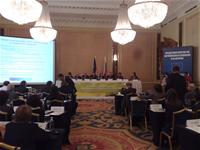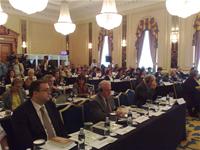Bulgaria needs transport infrastructure and reforms in the administration to be competitive
Adelina Marini, September 20, 2009
 Improving Bulgaria's transport infrastructure is a key and urgent prerequisite for the country's economic development. It is for this reason that close to a quarter of cohesion funds as been assigned to this objective. This is written in the chapter for Bulgaria of the annual country assessments of the European Economic Recovery Plan, approved in November last year in the peak of the global financial and economic crisis. The report shows that the weak uncoordinated and inefficient administration, as well as corruption, has led to substantial delays in current projects. That is why, these challenges need to be tackled with the utmost urgency and as a first priority the document suggests that the road infrastructure agency should be re-organised.
Improving Bulgaria's transport infrastructure is a key and urgent prerequisite for the country's economic development. It is for this reason that close to a quarter of cohesion funds as been assigned to this objective. This is written in the chapter for Bulgaria of the annual country assessments of the European Economic Recovery Plan, approved in November last year in the peak of the global financial and economic crisis. The report shows that the weak uncoordinated and inefficient administration, as well as corruption, has led to substantial delays in current projects. That is why, these challenges need to be tackled with the utmost urgency and as a first priority the document suggests that the road infrastructure agency should be re-organised.
The report was presented as an accompanying document to the public hearing, held on Friday in Sofia and organised by the Single Market Observatory of the European Economic and Social Committee, called: "Bulgaria and the single European market". Beside the above mentioned, the report outlines several more challenges that Bulgaria needs to face, like improving the business environment, cutting the red tape on local and national level, as well as improving competitiveness through increasing productivity, decrease of energy expenses and orienting the economy towards more science and green technology.
According to the conclusions in the document, Bulgaria is the most energy-intensive economy in the EU and is particularly vulnerable to energy price shocks. It is recommended that Bulgaria makes a transition towards low-carbon economy and increasing the long-term potential of the country for economic growth.
With regard to the improvement of the business environment and the reform of the administration, most concrete recommendations were made by Vasil Velev, member of the  Economic and Social Council of Bulgaria (ESCB). He reminded that in Bulgaria it is still a practice some illegal licenses to be administered, mostly on local level. Besides, quite often there are willing or unwilling mistakes in the interpretation or translation of the European legislation and sometimes, the harder license is being selected for the Bulgarian legislation. A body to oversee the implementation of legislation is also lacking. For example in many legislative acts the respective decrees from the e-government law and the trade register law are not included.
Economic and Social Council of Bulgaria (ESCB). He reminded that in Bulgaria it is still a practice some illegal licenses to be administered, mostly on local level. Besides, quite often there are willing or unwilling mistakes in the interpretation or translation of the European legislation and sometimes, the harder license is being selected for the Bulgarian legislation. A body to oversee the implementation of legislation is also lacking. For example in many legislative acts the respective decrees from the e-government law and the trade register law are not included.
Vasil Velev also pointed out that Bulgaria is lacking a reasonable effect estimation of the legislation over business. Quite often laws are being worked out in comfort to the administration instead the business and the citizens. Last but not least Mr. Velev outlined the problem with the silent refusal, incorporated in Bulgarian legislation. "Unless the silent agreement is not explicitly agreed in a law, the principle of silent refusal is default. The position of the business and the ESCB is that it must be vice versa - unless silent refusal is explicitly agreed in a law, then the default principle should be the silent agreement".
The ESCB wants an overall review of the current legislation and the preparation of proposals for Parliament to incorporate the requirements of the law for restriction of administrative regulation and the e-government law in all respective laws.
Another recommendation of the Council is the utmost simplification of all procedures and services, administered by the local and national authorities. A very good example for unnecessary complication of the relations between the business and the administration, according to Vasil Velev, is that each company pays its obligations to the National Revenues Agency by writing 30 payment orders instead of doing it with 1 document, 1 signature, 1 tax of the bank and the state to be obliged to distribute in the necessary proportions the necessary installments. The administration still requires the business to provide it with documents for the actual status of companies, documents for no obligations to the state, as well as certificates showing no previous conviction. And all this in spite the decree for e-government, requiring the administration to get these documents internally.
The ESCB also propose a alleviation of the annual financial reports of micro- and small enterprises because they are to a large extent the same as for the big enterprises. In Bulgaria there are some 700 big enterprises and over 250,000 medium and small enterprises which makes them 90% of all. At the moment there is a process going on in the EU of changing the relevant Directive, but the position of Bulgaria is reserved.
Regarding the single market, the chairman of the ESCB Mr. Lalko Dulevski said that the Council insists on a single European concept on the matter. He also put forward the following questions: "Is it possible for us now to talk about a single European market of labour, given the current distinctions on basic indicators like productivity of labour, wages, employment and unemployment? Let me clearly underline, with a lot of examples for national protectionism, and low workers' mobility? And let me put the question in another way - can we, after all, think and go to development of criteria that can help us say that Europe has the foundations of a single market of labour?"
 On his part, the minister for labour and social policy Mr. Totyu Mladenov said that Bulgaria needs to better adapt to the single market by realizing structural reforms of the labour market, education and the social sector.
On his part, the minister for labour and social policy Mr. Totyu Mladenov said that Bulgaria needs to better adapt to the single market by realizing structural reforms of the labour market, education and the social sector.
In its position for this year regarding the legal impediments for competitiveness, the European Economic and Social Council shows that the internal market is not yet fully established because the EU law has still not led to the effective functioning of the market in crucial areas like finance and energy. Regarding finance, the EU is already moving ahead towards common regulation and standardization. However, due to he lack of political will for a common energy policy, the issue with energy cannot be solved so far. So, 3 years after the last enlargement of the Union, we can hardly say that it has a well functioning single market. And the harms can easily be seen, especially in times of global crises.